
Following orthodontic treatment, a period of retention is required to reduce the risk of relapse. While the first 8 months following active treatment is considered critical most clinicians recommend longer time frames and often recommend life-long retention. Extended periods of retainer use may impact on oral hygiene routines and periodontal health.
The aim of this review was to assess the effects of fixed orthodontic retainers on periodontal health.
Methods
Searches were conducted in the Medline/PubMed, Embase, Cochrane Oral Health Group’s Trials Register and CENTRAL databases together with ClinicalTrials. gov, the National Research Register, and Pro-Quest Dissertation Abstracts and Thesis database. Randomised controlled trials (RCTs), controlled clinical trials, cohort studies of prospective and retrospective design, and cross- sectional studies were considered.
Two reviewers independently selected studies and extracted data. Study quality was assessed using the Cochrane risk of bias tool for RCTs, the Risk Of Bias In Non-randomized Studies of Interventions (ROBINs) tool for cohort studies and a modified version of the Newcastle-Ottawa Scale (NOS) Tool for cross-sectional studies. A qualitative summary of the findings was presented because of the heterogeneity of the included study designs.
Results
- 11 RCTs, 4 prospective cohort studies, 1 retrospective cohort study, and 13 cross-sectional studies were included.
- 10 studies compared individuals with fixed retainers to a control group without retainers. 3 of the studies found poorer periodontal status in those with retainers with 7 studies finding no adverse periodontal effects.
- 11 studies compared fixed to removable retainers with just one study reporting more gingival inflammation in the presence of a wire retainer.
- 4 studies assessed periodontal outcomes at different time point with 2 finding higher levels of gingival inflammation and 2 no detrimental effects.
- 13 studies considered different types of retainers with some studies suggesting either no or minor difference in gingival or periodontal status.
- 2 studies looked at different wire positions suggesting no influence
- 1 cross-sectional study compared short- and long-term effects of fixed retainers while higher calculus accumulation, greater marginal recession, and increased probing depth was seen with long-term retention this could have been accounted for by confounders.
Conclusions
The authors concluded: –
orthodontic fixed retainers seem to be a retention strategy rather compatible with periodontal health, or at least not related to severe detrimental effects on the periodontium. However, a lack of high-quality evidence is indisputable.
Comments
The reviewers have searched a good range of databases including a wide range of studies designs in the search for evidence to address their question. However, all of the included RCTs were at high or unclear risk of bias and while 2 of the cohort studies were considered to be good, they had a moderate risk of bias and all of the cross-sectional studies scored poorly on the NOS. There was also significant heterogeneity in the included studies because of the range of appliances and wires used and outcomes measured.
So while most of the included studies suggest that fixed retainers do not seem to affect periodontal health the quality of the available literature is very low an should be interpreted cautiously. Well conducted and reported high quality RCTs with long follow up periods are needed to provide better quality evidence.
Links
Primary Paper
Arn ML, Dritsas K, Pandis N, Kloukos D. The effects of fixed orthodontic retainers on periodontal health: A systematic review. Am J Orthod Dentofacial Orthop. 2020;157(2):156–164.e17. doi:10.1016/j.ajodo.2019.10.010
